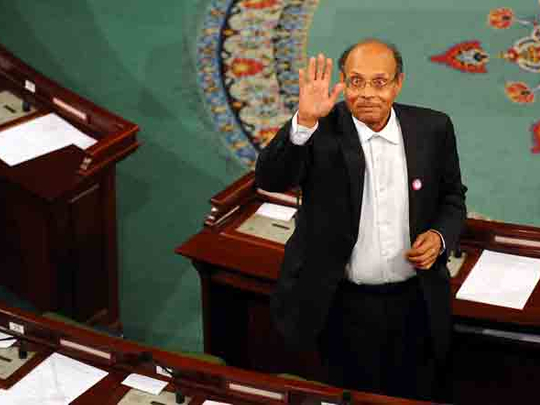
Manama: Tunisia’s new constituent assembly on Monday evening elected Munsif Al Marzouki, a former opposition figure, a doctor and rights activist, as the country’s interim president.
He was the only candidate running after eight applications were refused for not securing the support of at least 15 members of the assembly while one applicant was below the required age of 30 to run in the elections.
The opposition said that it would cast white ballots to express its frustration with the process after there was an agreement between the ruling coalition to elect Marzouki as Tunisia’s new leader.
His major task will be to help cure a badly-hit economy, seriously harmed by a series of labour action and dramatic downfall in tourism resources.
Marzouki’s election comes two days after the assembly endorsed a set of temporary bylaws that will guide the country until a full constitution is drafted by the 217 members chosen on October 23 in the first true multi-party elections.
Al Nahda, the moderate Islamist party, dominated the elections, but chose to head the government in line with its ideology favouring a parliamentarian system of governance.
The party, winner of 89 seats, opted for a tripartite coalition with the first runner-up, the Congress for the Republic, and Attakatol, a centre left party that came fourth in the landmark elections.
The coalition agreed to nominate Mustafa Bin Jaafar, the leader of Ettakatol as the head of the constituent assembly, and Marzouki, the leader of the Congress for the Republic as president of the North African nation. Under the deal, Al Nahda’s secretary general, Hamadi Jebali, will be the prime minister with powers that exceed, for the first time in the country’s history, those of the president.
Tunisia has had three presidents since its independence from France on March 20, 1956.
Habib Bourguiba ruled the country from 1956 until 1987 when he was deposed in a bloodless coup by Zine El Abidine Ben Ali.
A popular uprising that started on December 17 and culminated on January 14 resulted in Ben Ali fleeing Tunisia with his wife.
Fouad Mubazza was appointed interim president until the constituent assembly was formed to draft a constitution and choose a new leader.
Marzouki, born in July 1945, is one of the best known human rights activists in Tunisia since 1980.
A medical doctor who graduated in 1980 from the University of Strasbourg, France, he later moved back to Tunisia and was a professor of community medicine at the University of Sousse from 1981 until 2000.
He started his political and rights activism in 1980 after he joined the Tunisian League of Human Rights. In 1987, he was elected as deputy president of the league and in 1989 became the president of Africa’s first human rights watchdog.
However, the league was dissolved in June 1992 after it opposed a new law on associations.
Marzouki, determined not to be intimidated, set up in 1993 the national committee to defend opinion prisoners. The authorities immediately banned it, arguing it was illegal.
Even though the league was reinstated in 1993, Marzouki said that he was not interested in a position within the group.
The activist then announced that he wanted to run for president in 1994. His decision marked a new series of punitive actions against him that included prison terms and the confiscation of his passport.
Marzouki was member of the Cairo-based Arab human rights league, Amnesty International – Tunisia section, chairman of the Arab human rights commission and spokesman for the national council for freedoms in Tunisia.
Marzouki founded the Congress for the Republic in 2001 and was selected its chairman, even though the authorities did not recognize it. He went to Paris in 2001. He returned home on January 18, 2011, four days after the departure of Zine Al
Abidine Bin Ali.
Marzouki has published 16 books in Arabic and four in French, covering wide topics that ranged from medical ethics to human rights and the problems of democratisation in the Arab world.
Marzouki won in the historic elections as head of his party list in the governorate of Nabeul II, to the east of Tunis.












